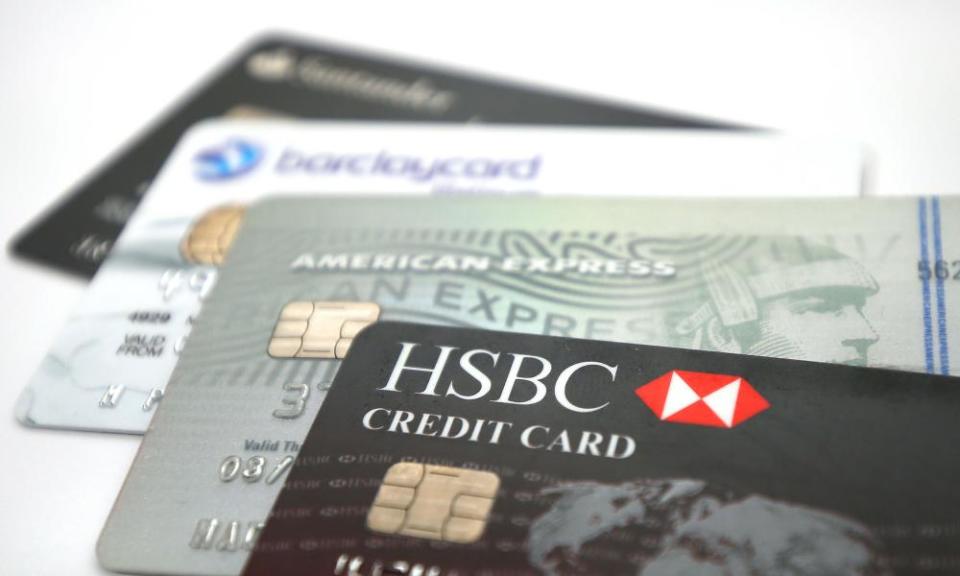Banks cracking down on lending after borrowing binge, survey finds

Worried lenders are starting to put the brakes on Britain’s consumer borrowing binge and plan to get tougher on credit card users, according to a Bank of England survey.
Its poll of all the main high street lenders showed they had cut access to credit in the opening months of this year and plan to limit it further. The proportion of lenders expecting to restrict access to credit between April and June was the highest since the financial crisis in 2008.
Those plans will be welcomed by financial regulators after their warnings on the rapid growth in borrowing in recent months as Britons have racked up debt on cards, car leasing schemes and personal loans.
But the prospect of households having less access to cash to spend will add to concerns that economic growth will slow this year. Consumer spending has been the main driver of the robust growth that has defied gloomy forecasts from economists since the EU referendum. But there is growing evidence that the engine of growth is losing steam, with retail sales slowing.
The Bank’s quarterly survey of lenders showed a net balance of 18.8% expect to tighten the availability of unsecured credit – money not borrowed against a home – to consumers over the second quarter of 2017. That was the highest proportion since late 2008. Lenders also reported the availability of such credit fell “slightly” in the first quarter of the year. It was the first drop since the autumn of 2012.
There were also signs in the survey that firms had become more nervous about investing before Brexit negotiations, with demand for corporate loans affected.
The news on tighter consumer lending conditions follows signs that households have been saving less and increasingly turning to borrowing to fund big purchases, such as cars, as well as day-to-day living costs as rising inflation takes a bigger chunk out of incomes.
The Bank of England’s own figures show consumer credit, which includes credit cards, car loans and second mortgages – was up by nearly 11% in the year to November, the fastest growth for 11 years. The pace of growth has since eased, but remains above 10%.
Policymakers have said they are worried about the risk to banks and other lenders from rising consumer borrowing, while charities have warned that households are becoming increasingly vulnerable to even small rises in interest rates.
Reflecting its concerns, the Bank’s financial policy committee recently announced a review into the credit quality of new lending – underwriting standards and the risk models used by banks.
The Bank’s survey showed credit scoring criteria for granting credit card and other unsecured loans had tightened in the first quarter. Lenders expected credit scoring criteria on credit card lending to “tighten significantly” in the second quarter, the Bank said.
Demand for credit card lending was reported to be unchanged in the first quarter, but was expected to increase slightly in the second quarter.
The Bank would be pleased that lenders had tightened credit scoring criteria and were planning to tighten them further in the second quarter, said Howard Archer, an economist at the consultancy IHS Markit.
“If the fundamentals for consumers do weaken further as expected over the coming months, it is vital that banks adopt tight lending standards in granting unsecured consumer credit, or it risks causing serious debt problems for the economy,” said Archer.
“This would be reinforced if the Bank of England felt compelled to raise interest rates due to mounting concern over the potential inflation overshoot,” he added, referring to signs inflation will continue to rise from its three-year high as the weak pound raises import costs for the UK.
But the survey was not such good news for commercial banks, said Nicholas Hyett, equity analyst at the investment firm Hargreaves Lansdown. Banking shares were among the biggest fallers on the FTSE 100 index on Thursday.
“Unsecured consumer credit is a pretty high margin business for banks, so less lending here will result in lower overall margins at the group level,” said Hyett.
For corporate lending, the Bank said its survey showed that following “significant falls” in demand from small and medium-sized businesses in the final three months of 2016, there were further falls in demand for lending from medium-sized businesses in the opening months of 2017.
“Lower capital investment was reported to be exerting a significant drag on demand for corporate lending in the first quarter, although increased merger and acquisition activity had pushed up on demand,” the Bank’s report on its survey said.
That echoed a survey by the British Chambers of Commerce, which found firms enjoyed an export boost from the weak pound over the first quarter but that their investment intentions remained low amid worries about rising costs and the economic outlook.

 Yahoo Finance
Yahoo Finance 